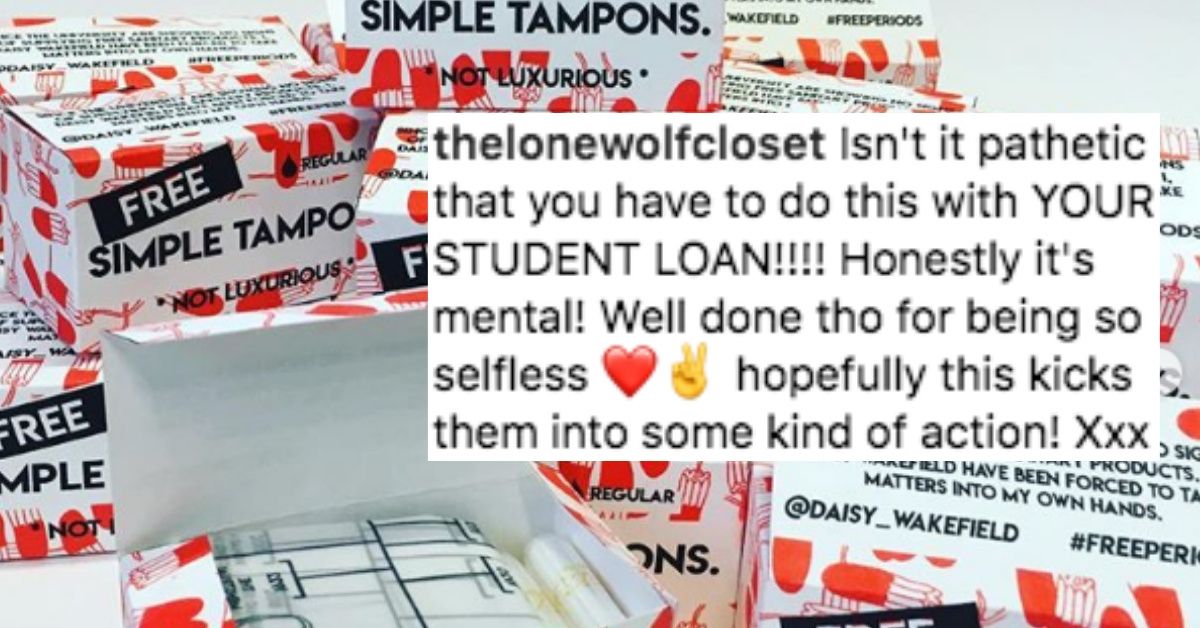For most students, college is their home away from home for a minimum of four years. The only difference? This home costs a lot more money than most of these students have seen in their lives at that point.
It's hard enough being a hard working student trying to get good grades so they can have a bright future. It's even harder for those who have taken out loans to pay for schooling.
Girls have the added stress of their menstrual cycle on top of all that. Every month, we get a little gift disturbs eating habits, breaks sleeping patterns, messes with emotions, and comes with a nasty little side effect called cramps.
Of course the worst part is the loss of blood and the need for sanitary products to make sure that blood doesn't stain our clothes or cause infections. Women spend a lot of money stocking up on these, and yet, it's never enough.
Then there's the constant stress of getting your period when you're unprepared. You don't have anything with you and you don't have anything back in your dorm and you can't wait until your next shopping trip. What are you supposed to do?
If you're 22-year-old University of the West of England (UWE) Bristol Daisy Wakefield, then you go to the nearest bathroom to grab supplies. Or at least, you should be able to.
Wakefield, a drawing and print student at UWE spent a portion of her university loan to pay for free sanitary products for students who can't afford them on their own. She used £100 ($129.90) on 40 hand-decorated boxes of tampons, which she is distributing on campus.
Wakefield decided to take action because the university had failed to cover the cost itself. It turns out she has contacted the university several times, trying to get them to step up and buy sanitary products for those who need them, but the responses weren't encouraging.
Announcing the project on Instagram, she wrote:
“After many emails saying 'I'll get back to you' or 'I'm not sure', I'm tired of UWE Bristol not addressing the crisis that is period poverty in the UK."
"I, Daisy Wakefield, have been forced to take matters into my own hands by supplying free sanitary products on all UWE Bristol campuses."
Wakefield spent six hours packaging the boxes she put in the university bathrooms, and posted a time-lapse video of the process on Instagram.
She told Press Association:
“My message is ultimately to de-stigmatise period poverty and menstruation as a whole. As a society we have been told to be quiet about our periods."
It's no wonder people feel they can't speak up about suffering with period poverty when so many can't even talk about their period."
In a statement, UWE Bristol said:
“Period poverty is a global issue and we're pleased UWE Bristol students are passionately advocating for change."
"The university does not currently supply free sanitary products on campus, though we would be pleased to meet with students to understand if there is an emerging need for this."
Philip Hammond, Chancellor of the Exchequer, announced during March's Spring Statement that the government will raise the funds needed to provide free sanitary products in secondary schools starting in September 2019.
Commenting on the government's promise, Labour MP Dawn Butler said:
“This is a victory for all those who have campaigned for an end to period poverty."
It's a disgrace that period poverty exists in the sixth richest country in the world."
Of course, schools and universities aren't the only places we need to think about. Some girls start their periods as early as elementary school. Some girls and women live in shelters because of homelessness or domestic abuse. How will they get access to sanitary products?
That's the issue Janet Daby brought up:
Girls go through this every month and are often underprepared for it, whether it be due to the cost of sanitary products or the irregularity of their cycle, or another reason altogether.
Wakefield's project is very necessary, but should've come even earlier. People have spent years of campaigning for an end to period poverty from charities, including Bloody Good Period, which supplies sanitary products for refugees and asylum seekers in London and Leeds.
Liberal Democrat spokeswoman Layla Moran said:
“It is appalling that students and campaigners such as Daisy Wakefield are having to take matters into their own hands to ensure that no woman misses out on education because of period poverty."
Research from children's charity Plan International UK found that one in 10 girls cannot afford to buy menstrual products.
A separate survey found that more than 137,700 children in the UK have missed school because of period poverty.
Wakefield said:
“We need to look at the success of universities such as; Glasgow, Edinburgh, and Exeter, who provide free sanitary products and look at how it's supported their students."
Wakefield took on a project that is needed at most schools, and that is the most unfortunate part about all of this. There should be no question or debate about whether or not schools should provide sanitary products. It should be common sense that they should.
A 22-year-old should not spend part of her loan money to do what the university wouldn't. While access to tampons and pads may seem like a small thing for those of us who have never been without them, it is a serious equal rights issue that women need to fight for until no girl ever needs to fear being unprepared for their period for any reason.
 COMICSANDS
COMICSANDS percolately
percolately georgetakei
georgetakei secondnexus
secondnexus george's picks
george's picks












